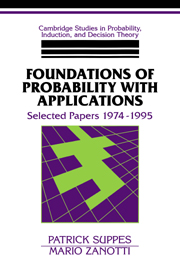Book contents
- Frontmatter
- Contents
- Preface
- Part I Foundations of probability
- 1 Necessary and sufficient conditions for existence of a unique measure strictly agreeing with a qualitative probability ordering
- 2 Necessary and sufficient qualitative axioms for conditional probability
- 3 On using random relations to generate upper and lower probabilities
- 4 Conditions on upper and lower probabilities to imply probabilities
- 5 Qualitative axioms for random-variable representation of extensive quantities
- Part II Causality and quantum mechanics
- Part III Applications in education
- Author Index
- Subject Index
4 - Conditions on upper and lower probabilities to imply probabilities
Published online by Cambridge University Press: 05 June 2012
- Frontmatter
- Contents
- Preface
- Part I Foundations of probability
- 1 Necessary and sufficient conditions for existence of a unique measure strictly agreeing with a qualitative probability ordering
- 2 Necessary and sufficient qualitative axioms for conditional probability
- 3 On using random relations to generate upper and lower probabilities
- 4 Conditions on upper and lower probabilities to imply probabilities
- 5 Qualitative axioms for random-variable representation of extensive quantities
- Part II Causality and quantum mechanics
- Part III Applications in education
- Author Index
- Subject Index
Summary
We want to begin this paper with recording our joint indebtedness to de Finetti for so enriching the theory of probability, especially its foundations.
Suppes:
I met de Finetti in May of 1960 at a symposium in Paris on decision theory. We had several lively informal conversations about the role of the axiom of choice in the foundations of probability, especially in relation to the existence of countably additive measures. Over the years I had the opportunity to meet de Finetti on various occasions. I recall a memorable walk with de Finetti and Jimmy Savage in the gardens of the Villa Frascati near Rome later in the 1960s. On this occasion we had a long discussion of determinism and quantum mechanics, and what the existence of indeterminism and quantum mechanics implied for subjective theories of probability. The last time I saw de Finetti was in Rome in March 1979. My wife and I invited de Finetti to dinner, and after dinner he and I had a wide-ranging philosophical discussion, which he conducted with his usual vigor. In fact, even though he was then in his late seventies, I finally gave up at about 12:30 a.m., and said good night, outdone by his continuing vitality and energy in philosophical conversation.
Zanotti:
I met de Finetti in 1971 at de Finetti's summer residence in the vicinity of Rome, after correspondence beginning in 1969. He stated in one of the letters and in discussion his sympathy for the main aspects of Quine's philosophy. […]
- Type
- Chapter
- Information
- Foundations of Probability with ApplicationsSelected Papers 1974–1995, pp. 29 - 49Publisher: Cambridge University PressPrint publication year: 1996



